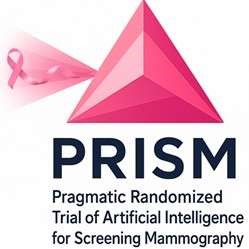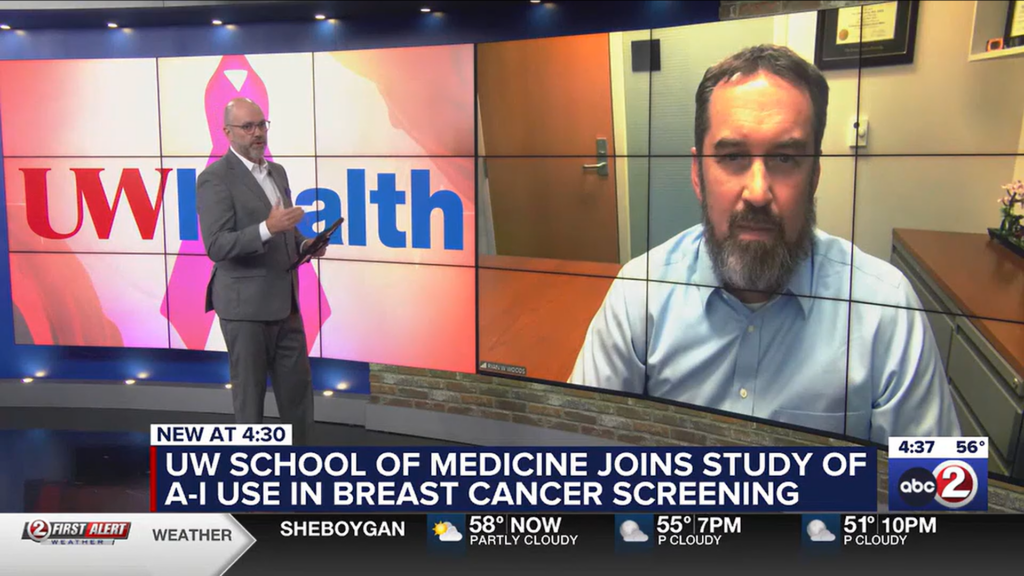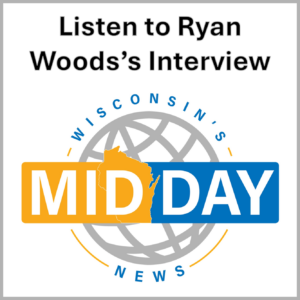 The University of Wisconsin–Madison and UW Health will assess whether artificial intelligence (AI) can effectively assist radiologists in the interpretation of mammograms as part of a national clinical trial. Wisconsin media outlets interviewed Christoph Lee, MD, MS, MBA; Mai Elezaby, MD; and Ryan Woods, MD, MPH about the exciting potential of improving cancer detection and reducing unnecessary callbacks and anxiety for patients.
The University of Wisconsin–Madison and UW Health will assess whether artificial intelligence (AI) can effectively assist radiologists in the interpretation of mammograms as part of a national clinical trial. Wisconsin media outlets interviewed Christoph Lee, MD, MS, MBA; Mai Elezaby, MD; and Ryan Woods, MD, MPH about the exciting potential of improving cancer detection and reducing unnecessary callbacks and anxiety for patients.
Funded by a $16 million grant from the Patient Centered Outcomes Research Institute and co-led by UCLA and UC Davis, the PRISM Trial (Pragmatic Randomized Trial of Artificial Intelligence for Screening Mammography) will comprise of 400,000 patients at seven sites across the United States, including an estimated 50,000 in Wisconsin, over the next two years. While a radiologist will read every mammogram, the AI tool will be turned on for half and generate information that may or may not help the radiologist make the final diagnosis.
In addition to Dr. Lee, who serves as the national co-principal investigator, four other UW Department of Radiology faculty members will help lead this pivotal trial. That includes Drs. Elezaby and Woods as co-site PIs, as well as Richard Bruce, MD and John Garrett, PhD as co-investigators.
Through TV news segments, radio interviews, podcasts, and articles in October 2025, Drs. Lee, Elezaby and Woods provided information about the trial and their hopes for AI use in breast cancer screening. In addition to the coverage highlighted below, Dr. Elezaby was interviewed for a WDJT CBS 58 News segment.
Christoph Lee’s Interview with WMTV 15 News
During a WMTV 15 News segment on October 17, 2025, Dr. Lee discussed the trial with reporter Ashley Weil and how it differs from previous studies of AI use for reading mammograms.
“A lot of the evidence that’s available right now for artificial intelligence and improved accuracy and mammography are retrospective, meaning that we’ve applied the AI to past exams and seen theoretically that they may improve diagnostic accuracy,” explained Dr. Lee.
With so many people impacted by breast cancer, the promising results from these early studies helped make the case for this trial across six states.
“Even with expert interpreters and improved technologies, we still miss about one in eight breast cancers,” said Dr. Lee. “These cancers could be very small, maybe imperceptible to the human eye, or hidden behind dense breast tissue. So these deep learning algorithms that could see texture features and possibly different patterns in the images that humans can’t, could lead to earlier cancer detection.”
While WMTV reaches viewers in Madison and southern Wisconsin, multiple TV stations across the state picked up clips from the segment. That included WBAY (Green Bay), WLUK (Green Bay), WEAU-TV (La Crosse-Eau Claire), and WZAM (Wausau). WIFR in Illinois and WKYT in Kentucky also ran excerpts from the original.
Ryan Woods’s Interview with WBAY Action 2 News

WBAY Action 2 News Host Chris Roth interviewed Dr. Woods live on October 15, 2025. The two discussed the skepticism of AI usage, with Dr. Woods emphasizing that the AI tool would only be used to support the radiologist.
“The important thing to remember is that the radiologist is always considered sort of in the driver’s seat for interpretation of the exam. We always use AI as an adjunct tool with oversight by the radiologist,” said Dr. Woods.
While the AI tool could prove helpful to radiologists, the impact on patient care is the primary focus. “Ultimately by helping us as radiologists, we’re helping patients,” he concluded.
Ryan Woods’s Interview with Wisconsin’s Midday News
 Dr. Woods sat down for a nine-minute chat with hosts Greg Matzek and Jessica Tighe for the 620 TMJ Radio show, Wisconsin’s Midday News, on October 9, 2025. The show is also shared as a podcast and the “PRISM Trial in Wisconsin” episode is available on their website, Spotify, as well as Apple Podcasts.
Dr. Woods sat down for a nine-minute chat with hosts Greg Matzek and Jessica Tighe for the 620 TMJ Radio show, Wisconsin’s Midday News, on October 9, 2025. The show is also shared as a podcast and the “PRISM Trial in Wisconsin” episode is available on their website, Spotify, as well as Apple Podcasts.
In addition to talking about how the AI tool will be used, Dr. Woods explained how UW–Madison became the only trial site in the Midwest due to Dr. Lee being a national co-PI and involved in establishing the trial. He also shared his hopes for how an AI tool could help rural communities.
“In rural practices you may have radiologists who don’t have specific fellowship training in breast imaging,” Dr. Woods explained. “A tool like this can really improve their confidence and accuracy and ability to identify cancers and also decrease those false positives.”
The radio station reran excepts from the interview, including this clip from October 10, 2025.
Mai Elezaby and Christoph Lee’s Interview with Milwaukee Journal Sentinel
The Milwaukee Journal Sentinel interviewed both Drs. Elezaby and Lee for the article “Wisconsin joins clinical trial to see if AI can catch more breast cancer cases” by Madeline Heim, which was published on October 13, 2025.
They emphasized the importance of balancing the excitement for the tool’s potential and the need to truly evaluate its effectiveness.
“The promise of AI in finding cancers earlier, when you could intervene and cure them, is a really important goal,” Dr. Lee said. “What we want to do is make sure that we show that they are truly effective.”
Since AI tools are already being adapted rapidly, this trial will be critical in determining if the benefits outweigh drawbacks. For instance, there have been some cases of the AI over-identifying areas of concern that end up not being cancer.
“With every technological advancement, there’s the enthusiasm for it, but I think the important thing is the caution,” Dr. Elezaby stated. She also noted that the trial will only use AI as an aid for the radiologist.
“It’s almost like having a partner that is giving you some feedback,” she said.
Information from the article was used for the PCMag article “Is AI Good at Detecting Breast Cancer? First Major Study Aims to Find Out” and the Mix 93.3 article “ Can AI Detect Breast Cancer?” It was also rerun in the Blue Water Healthy Living magazine.